Top 10 Space Exploration Movies
"Space, the final frontier"
Film fans the world over have been excited about Christopher Nolan's sci-fi epic
Interstellar ever since it was announced. Fan hype is at a peak and with
Interstellar about to be released, now is a great time for us to look at some of the best movies about the wonders and dangers of space exploration.
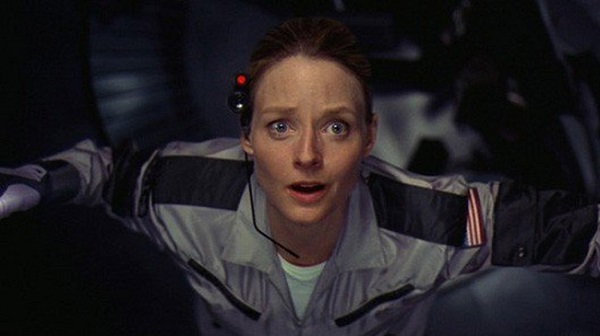 10. Contact
Interstellar
10. Contact
Interstellar will use theories about wormholes to allow space travel to other planets to be possible. But it is not the first film use wormholes as its method of space travel,
Contact also uses them in an earthbound space travel movie. Based on a novel by Carl Sagan,
Contact was directed by
Back to the Future's Robert Zemeckis and tells the story of how humanity receives the first message from an advanced civilization and gives them plans to build a machine to teleport a person to their home world. The debate about science and religion is at the center of this film and looks at the impact that the discovery of alien life would have on society. The special effects were excellent for the time, especially the terrorist attack, but it was controversial for using and editing CNN footage of President Bill Clinton and CNN changing how their brand would appear on future movies.
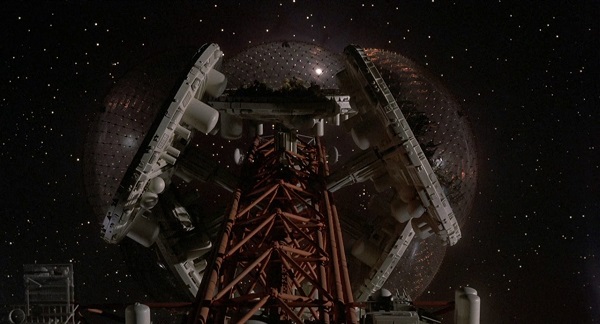 9. Silent Running
9. Silent Running
Douglas Trumbull is one of the greatest special effects artists to ever work in cinema, with movies like
2001: A Space Odyssey,
Blade Runner and
The Tree of Life in his filmography. He was also an occasional director and his directional debut
Silent Running is an underrated classic, which influenced movies like
Wall-E and
Moon. In the future, all plant life on Earth has become extinct and in space a small team of astronauts maintain biodomes with the last remaining plants with the aim to replant them. But after the team is ordered to destroy the domes, one of the astronauts (Bruce Dern) goes rogue and seizes control of the space freighter to protect Earth's last pieces of natural life and goes into deep space with three drones for company.
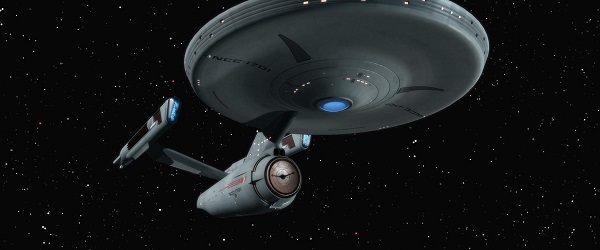 8. Star Trek Franchise
8. Star Trek Franchise
'Space, the final frontier', that is the mantra of the
Star Trek series. Created by Gene Roddenberry, the
Star Trek franchise has spanned nearly 50 years with the adventures of the Enterprise and the Federation appearing in television, books, comics, video games and of course, films. The film franchise itself has spanned 12 movies that vary in quality. The movies have attempted cerebral grandeur (
Star Trek: The Motion Picture), dark revenge dramas (
Star Trek II: The Wrath of Khan), light hearted comedies (
Star Trek IV: The Voyage Home), political commentaries (
Star Trek IV: The Undiscovered Country) and big action blockbusters (the rebooted series). The series has used all its sci-fi elements, having stories about time travel, impending war and inter-special conflicts and exploring alien cultures and planets.
Star Trek is a wide ranging franchise with a long internal history and world building as humanity and its allies explore the universe.
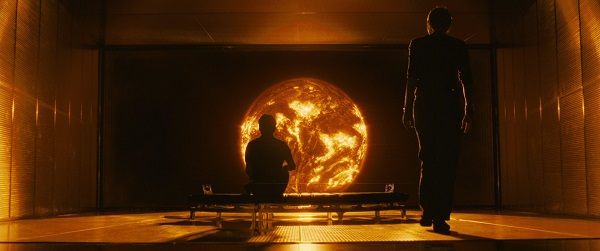 7. Sunshine
7. Sunshine
Director Danny Boyle and screenwriter Alex Garland are two giants of the British film industry and they teamed up for a second time when they made
Sunshine. Set in the year 2057 the Sun is dying, threatening Earth's existence. Humanity has one final attempt to save the planet and themselves by sending a spaceship Icarus II (you would think that scientists would see the irony) with a nuclear bomb the size of Manhattan to kick-start our star. But as the team of scientists get closer to the Sun their mission becomes more perilous as they discover what happened to a similar mission seven years earlier.
Sunshine is an ambitious movie that explores the psychological and practical aspects of space travel.
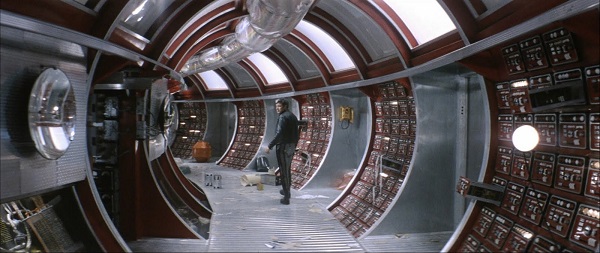 6. Solaris
Solaris
6. Solaris
Solaris is considered to be one of the greatest movies to be made in the Soviet Union, winning the Grand Prix Spécial du Juryand FIPRESCI prize at the 1972 Cannes and nominated for the Palme d'Or.
Solaris is one of the finest movies in Andrei Tarkovsky's filmography which features movies like
Andrei Rublev and
The Sacrifice.
Solaris is as much a psychological and personal drama as it is a sci-fi and art film telling the story of Kris Kelvis (Donatas Banionis), a psychologist who is sent to a space station where the crew had gone insane.
Solaris was remade by Steven Soderbergh and George Clooney in 2002.
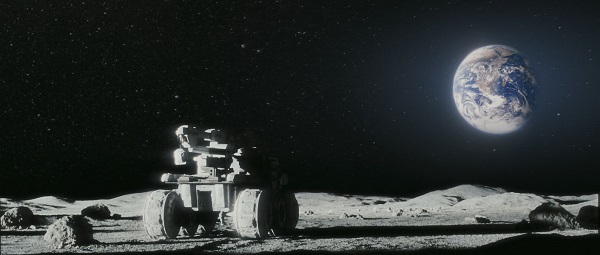 5. Moon
5. Moon
Filmed with a budget of $5 Million
Moon is a very ambitious and interesting movie, evoking sci-fi movies of the 70s.
Moon was a brilliant tour de force for director Duncan Jones making his directional debut and Sam Rockwell who stars by himself. In the future, Earth gets all the clean fuel it needs by mining helium-3 from the Moon. Rockwell stars as Sam Bell, an astronaut on the Moon running the operation by himself and is coming to the end of a three year contract. But Sam's identity and sense of existence is thrown into question after an accident and he has to discover the mystery of his past and real purpose of his mission.
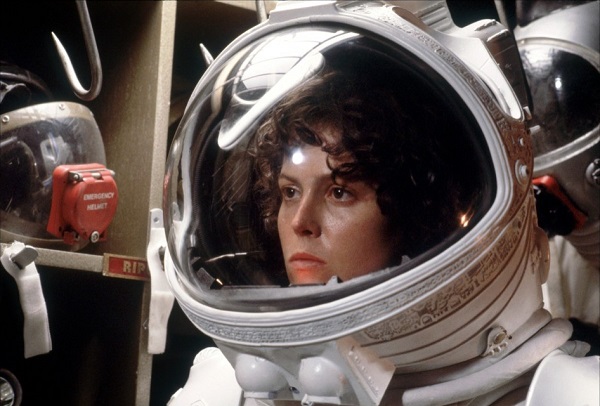 4. Alien Franchise
4. Alien Franchise
The
Alien franchise is beloved franchise (for the most part), spanning 35 years and five movies, excluding the
Alien vs. Predator series. The
Alien series set out to be a much more darker and grittier approach to space travel, that space travel is hard and dangerous. In the first movie the crew of the Nostromo are not scientists or soldiers, they are basically merchant sailors doing their job and have no place to run when their ship is haunted by a ruthless monster. The sequels
Aliens and
Alien3 looked at humanity at the edge of their existence in the harshest environments possible. The divisive prequel
Prometheus continued this trend of the hardships of space travel as a team of scientists go to a planet to see if they can discover the origins of man.
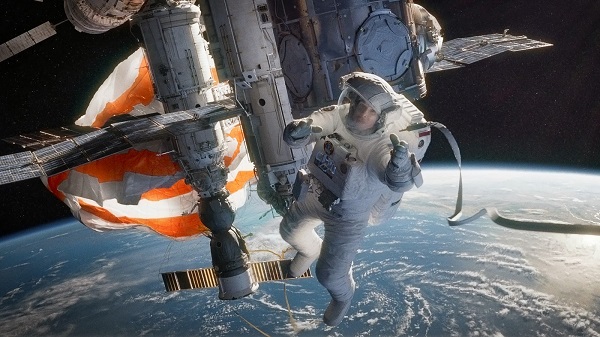 3. Gravity
3. Gravity
Alfonso Cuarón's
Gravity was one of 2013's biggest movies, making $716 Million worldwide and winning seven Academy Awards. Telling a simple story of two astronauts, Dr Ryan Stone (Sandra Bullock) and Lt. Matt Kowalski (George Clooney) who get stranded in space after debit orbits the Earth,
Gravity is a technical marvel, having some of the best CGI and 3D effects put to screen. The 3D effects were used to highlight the depths of space and Cuarón use of long continuous shots added to both the beauty and the ultimate risks of space.
Gravity is both a thrill ride and an emotional experience as one woman battles to get back home safely as she faces impossible odds in a sci-fi version of a shipwreck/survival movie.
Gravity sets out to show the perils of space travel, even if it takes the idea to its extremes.
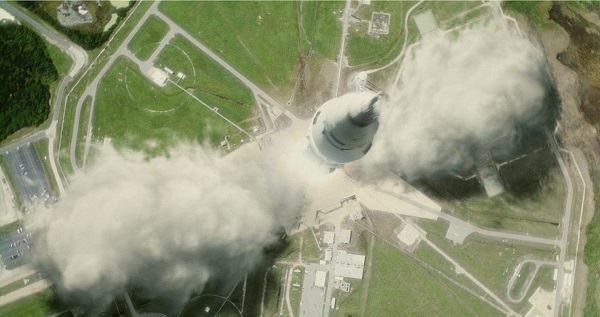 2. Apollo 13
2. Apollo 13
Not all films about space exploration are sci-fi movies, they can also be historical dramas, including Ron Howard's
Apollo 13. Nominated for Academy Awards for nine and winning two for Best Film Editing and Best Sound when competing in a strong year.
Apollo 13 tells the story about the 'successful failure' of the Apollo 13 mission that suffered disaster when going to the moon.
Apollo 13 focuses on the astronauts and the NASA ground control have to find away to bring their capsule safely to Earth with the limited resources on the craft: "failure is not an option!"
Apollo 13 is an excellent movie for anyone who is interested in the history of NASA and the risks that astronauts have had and still have to face.
Apollo 13 is one of Howard's best movies and the special effects still hold up to this day.
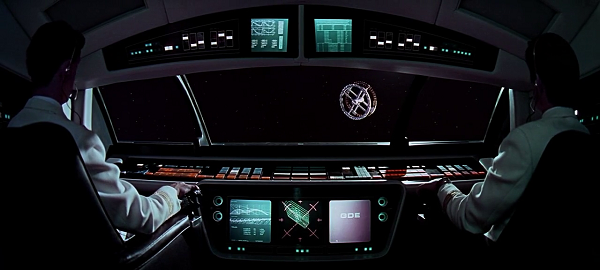 1. 2001: A Space Odyssey
1. 2001: A Space Odyssey
Stanley Kubrick has a fantastic filmography that most writers and directors would kill for and
2001: A Space Odyssey is easily considered one of his best.
2001: A Space Odyssey is an ambitious movie, both artistically and technically, telling an epic from the dawn of mankind to the evolution of a new species. It is a movie that is open to interpretation as humanity battles between its need for advancement and discovery and need for destruction as scientists try to figure out the importance of the monoliths. The special effects by Douglas Trumbull contain some of the best model work put to screen, showing detailed space stations and space craft in the vast emptiness of space. Co-writer Arthur C. Clarke wanted to be as scientific realistic as possible when showing space travel, including the time of travel, delays in communication and soundless vacuum of space. A must for anyone who considers themselves a sci-fi fan or cinephile.
 10. Contact
Interstellar will use theories about wormholes to allow space travel to other planets to be possible. But it is not the first film use wormholes as its method of space travel, Contact also uses them in an earthbound space travel movie. Based on a novel by Carl Sagan, Contact was directed by Back to the Future's Robert Zemeckis and tells the story of how humanity receives the first message from an advanced civilization and gives them plans to build a machine to teleport a person to their home world. The debate about science and religion is at the center of this film and looks at the impact that the discovery of alien life would have on society. The special effects were excellent for the time, especially the terrorist attack, but it was controversial for using and editing CNN footage of President Bill Clinton and CNN changing how their brand would appear on future movies.
10. Contact
Interstellar will use theories about wormholes to allow space travel to other planets to be possible. But it is not the first film use wormholes as its method of space travel, Contact also uses them in an earthbound space travel movie. Based on a novel by Carl Sagan, Contact was directed by Back to the Future's Robert Zemeckis and tells the story of how humanity receives the first message from an advanced civilization and gives them plans to build a machine to teleport a person to their home world. The debate about science and religion is at the center of this film and looks at the impact that the discovery of alien life would have on society. The special effects were excellent for the time, especially the terrorist attack, but it was controversial for using and editing CNN footage of President Bill Clinton and CNN changing how their brand would appear on future movies.
 9. Silent Running
Douglas Trumbull is one of the greatest special effects artists to ever work in cinema, with movies like 2001: A Space Odyssey, Blade Runner and The Tree of Life in his filmography. He was also an occasional director and his directional debut Silent Running is an underrated classic, which influenced movies like Wall-E and Moon. In the future, all plant life on Earth has become extinct and in space a small team of astronauts maintain biodomes with the last remaining plants with the aim to replant them. But after the team is ordered to destroy the domes, one of the astronauts (Bruce Dern) goes rogue and seizes control of the space freighter to protect Earth's last pieces of natural life and goes into deep space with three drones for company.
9. Silent Running
Douglas Trumbull is one of the greatest special effects artists to ever work in cinema, with movies like 2001: A Space Odyssey, Blade Runner and The Tree of Life in his filmography. He was also an occasional director and his directional debut Silent Running is an underrated classic, which influenced movies like Wall-E and Moon. In the future, all plant life on Earth has become extinct and in space a small team of astronauts maintain biodomes with the last remaining plants with the aim to replant them. But after the team is ordered to destroy the domes, one of the astronauts (Bruce Dern) goes rogue and seizes control of the space freighter to protect Earth's last pieces of natural life and goes into deep space with three drones for company.
 8. Star Trek Franchise
'Space, the final frontier', that is the mantra of the Star Trek series. Created by Gene Roddenberry, the Star Trek franchise has spanned nearly 50 years with the adventures of the Enterprise and the Federation appearing in television, books, comics, video games and of course, films. The film franchise itself has spanned 12 movies that vary in quality. The movies have attempted cerebral grandeur (Star Trek: The Motion Picture), dark revenge dramas (Star Trek II: The Wrath of Khan), light hearted comedies (Star Trek IV: The Voyage Home), political commentaries (Star Trek IV: The Undiscovered Country) and big action blockbusters (the rebooted series). The series has used all its sci-fi elements, having stories about time travel, impending war and inter-special conflicts and exploring alien cultures and planets. Star Trek is a wide ranging franchise with a long internal history and world building as humanity and its allies explore the universe.
8. Star Trek Franchise
'Space, the final frontier', that is the mantra of the Star Trek series. Created by Gene Roddenberry, the Star Trek franchise has spanned nearly 50 years with the adventures of the Enterprise and the Federation appearing in television, books, comics, video games and of course, films. The film franchise itself has spanned 12 movies that vary in quality. The movies have attempted cerebral grandeur (Star Trek: The Motion Picture), dark revenge dramas (Star Trek II: The Wrath of Khan), light hearted comedies (Star Trek IV: The Voyage Home), political commentaries (Star Trek IV: The Undiscovered Country) and big action blockbusters (the rebooted series). The series has used all its sci-fi elements, having stories about time travel, impending war and inter-special conflicts and exploring alien cultures and planets. Star Trek is a wide ranging franchise with a long internal history and world building as humanity and its allies explore the universe.
 7. Sunshine
Director Danny Boyle and screenwriter Alex Garland are two giants of the British film industry and they teamed up for a second time when they made Sunshine. Set in the year 2057 the Sun is dying, threatening Earth's existence. Humanity has one final attempt to save the planet and themselves by sending a spaceship Icarus II (you would think that scientists would see the irony) with a nuclear bomb the size of Manhattan to kick-start our star. But as the team of scientists get closer to the Sun their mission becomes more perilous as they discover what happened to a similar mission seven years earlier. Sunshine is an ambitious movie that explores the psychological and practical aspects of space travel.
7. Sunshine
Director Danny Boyle and screenwriter Alex Garland are two giants of the British film industry and they teamed up for a second time when they made Sunshine. Set in the year 2057 the Sun is dying, threatening Earth's existence. Humanity has one final attempt to save the planet and themselves by sending a spaceship Icarus II (you would think that scientists would see the irony) with a nuclear bomb the size of Manhattan to kick-start our star. But as the team of scientists get closer to the Sun their mission becomes more perilous as they discover what happened to a similar mission seven years earlier. Sunshine is an ambitious movie that explores the psychological and practical aspects of space travel.
 6. Solaris
Solaris is considered to be one of the greatest movies to be made in the Soviet Union, winning the Grand Prix Spécial du Juryand FIPRESCI prize at the 1972 Cannes and nominated for the Palme d'Or. Solaris is one of the finest movies in Andrei Tarkovsky's filmography which features movies like Andrei Rublev and The Sacrifice. Solaris is as much a psychological and personal drama as it is a sci-fi and art film telling the story of Kris Kelvis (Donatas Banionis), a psychologist who is sent to a space station where the crew had gone insane. Solaris was remade by Steven Soderbergh and George Clooney in 2002.
6. Solaris
Solaris is considered to be one of the greatest movies to be made in the Soviet Union, winning the Grand Prix Spécial du Juryand FIPRESCI prize at the 1972 Cannes and nominated for the Palme d'Or. Solaris is one of the finest movies in Andrei Tarkovsky's filmography which features movies like Andrei Rublev and The Sacrifice. Solaris is as much a psychological and personal drama as it is a sci-fi and art film telling the story of Kris Kelvis (Donatas Banionis), a psychologist who is sent to a space station where the crew had gone insane. Solaris was remade by Steven Soderbergh and George Clooney in 2002.
 5. Moon
Filmed with a budget of $5 Million Moon is a very ambitious and interesting movie, evoking sci-fi movies of the 70s. Moon was a brilliant tour de force for director Duncan Jones making his directional debut and Sam Rockwell who stars by himself. In the future, Earth gets all the clean fuel it needs by mining helium-3 from the Moon. Rockwell stars as Sam Bell, an astronaut on the Moon running the operation by himself and is coming to the end of a three year contract. But Sam's identity and sense of existence is thrown into question after an accident and he has to discover the mystery of his past and real purpose of his mission.
5. Moon
Filmed with a budget of $5 Million Moon is a very ambitious and interesting movie, evoking sci-fi movies of the 70s. Moon was a brilliant tour de force for director Duncan Jones making his directional debut and Sam Rockwell who stars by himself. In the future, Earth gets all the clean fuel it needs by mining helium-3 from the Moon. Rockwell stars as Sam Bell, an astronaut on the Moon running the operation by himself and is coming to the end of a three year contract. But Sam's identity and sense of existence is thrown into question after an accident and he has to discover the mystery of his past and real purpose of his mission.
 4. Alien Franchise
The Alien franchise is beloved franchise (for the most part), spanning 35 years and five movies, excluding the Alien vs. Predator series. The Alien series set out to be a much more darker and grittier approach to space travel, that space travel is hard and dangerous. In the first movie the crew of the Nostromo are not scientists or soldiers, they are basically merchant sailors doing their job and have no place to run when their ship is haunted by a ruthless monster. The sequels Aliens and Alien3 looked at humanity at the edge of their existence in the harshest environments possible. The divisive prequel Prometheus continued this trend of the hardships of space travel as a team of scientists go to a planet to see if they can discover the origins of man.
4. Alien Franchise
The Alien franchise is beloved franchise (for the most part), spanning 35 years and five movies, excluding the Alien vs. Predator series. The Alien series set out to be a much more darker and grittier approach to space travel, that space travel is hard and dangerous. In the first movie the crew of the Nostromo are not scientists or soldiers, they are basically merchant sailors doing their job and have no place to run when their ship is haunted by a ruthless monster. The sequels Aliens and Alien3 looked at humanity at the edge of their existence in the harshest environments possible. The divisive prequel Prometheus continued this trend of the hardships of space travel as a team of scientists go to a planet to see if they can discover the origins of man.
 3. Gravity
Alfonso Cuarón's Gravity was one of 2013's biggest movies, making $716 Million worldwide and winning seven Academy Awards. Telling a simple story of two astronauts, Dr Ryan Stone (Sandra Bullock) and Lt. Matt Kowalski (George Clooney) who get stranded in space after debit orbits the Earth, Gravity is a technical marvel, having some of the best CGI and 3D effects put to screen. The 3D effects were used to highlight the depths of space and Cuarón use of long continuous shots added to both the beauty and the ultimate risks of space. Gravity is both a thrill ride and an emotional experience as one woman battles to get back home safely as she faces impossible odds in a sci-fi version of a shipwreck/survival movie. Gravity sets out to show the perils of space travel, even if it takes the idea to its extremes.
3. Gravity
Alfonso Cuarón's Gravity was one of 2013's biggest movies, making $716 Million worldwide and winning seven Academy Awards. Telling a simple story of two astronauts, Dr Ryan Stone (Sandra Bullock) and Lt. Matt Kowalski (George Clooney) who get stranded in space after debit orbits the Earth, Gravity is a technical marvel, having some of the best CGI and 3D effects put to screen. The 3D effects were used to highlight the depths of space and Cuarón use of long continuous shots added to both the beauty and the ultimate risks of space. Gravity is both a thrill ride and an emotional experience as one woman battles to get back home safely as she faces impossible odds in a sci-fi version of a shipwreck/survival movie. Gravity sets out to show the perils of space travel, even if it takes the idea to its extremes.
 2. Apollo 13
Not all films about space exploration are sci-fi movies, they can also be historical dramas, including Ron Howard's Apollo 13. Nominated for Academy Awards for nine and winning two for Best Film Editing and Best Sound when competing in a strong year. Apollo 13 tells the story about the 'successful failure' of the Apollo 13 mission that suffered disaster when going to the moon. Apollo 13 focuses on the astronauts and the NASA ground control have to find away to bring their capsule safely to Earth with the limited resources on the craft: "failure is not an option!" Apollo 13 is an excellent movie for anyone who is interested in the history of NASA and the risks that astronauts have had and still have to face. Apollo 13 is one of Howard's best movies and the special effects still hold up to this day.
2. Apollo 13
Not all films about space exploration are sci-fi movies, they can also be historical dramas, including Ron Howard's Apollo 13. Nominated for Academy Awards for nine and winning two for Best Film Editing and Best Sound when competing in a strong year. Apollo 13 tells the story about the 'successful failure' of the Apollo 13 mission that suffered disaster when going to the moon. Apollo 13 focuses on the astronauts and the NASA ground control have to find away to bring their capsule safely to Earth with the limited resources on the craft: "failure is not an option!" Apollo 13 is an excellent movie for anyone who is interested in the history of NASA and the risks that astronauts have had and still have to face. Apollo 13 is one of Howard's best movies and the special effects still hold up to this day.
 1. 2001: A Space Odyssey
Stanley Kubrick has a fantastic filmography that most writers and directors would kill for and 2001: A Space Odyssey is easily considered one of his best. 2001: A Space Odyssey is an ambitious movie, both artistically and technically, telling an epic from the dawn of mankind to the evolution of a new species. It is a movie that is open to interpretation as humanity battles between its need for advancement and discovery and need for destruction as scientists try to figure out the importance of the monoliths. The special effects by Douglas Trumbull contain some of the best model work put to screen, showing detailed space stations and space craft in the vast emptiness of space. Co-writer Arthur C. Clarke wanted to be as scientific realistic as possible when showing space travel, including the time of travel, delays in communication and soundless vacuum of space. A must for anyone who considers themselves a sci-fi fan or cinephile.
1. 2001: A Space Odyssey
Stanley Kubrick has a fantastic filmography that most writers and directors would kill for and 2001: A Space Odyssey is easily considered one of his best. 2001: A Space Odyssey is an ambitious movie, both artistically and technically, telling an epic from the dawn of mankind to the evolution of a new species. It is a movie that is open to interpretation as humanity battles between its need for advancement and discovery and need for destruction as scientists try to figure out the importance of the monoliths. The special effects by Douglas Trumbull contain some of the best model work put to screen, showing detailed space stations and space craft in the vast emptiness of space. Co-writer Arthur C. Clarke wanted to be as scientific realistic as possible when showing space travel, including the time of travel, delays in communication and soundless vacuum of space. A must for anyone who considers themselves a sci-fi fan or cinephile.